

the effects of social isolation on elder
Meaning of Social Isolation. Society of Certified Senior Advisors: Social Isolation and Loneliness in Older Adults. What is Loneliness and Social Isolation?

Loneliness and social isolation are in direct contrast to the basic human need for love and belonging. Social isolation effects everyone at any age but continues to become more prevalent in older age and can be detrimental to both physical and mental health. All over the globe, social isolation rates continue to increase, particularly in older adults. According to a recent AARP report, social isolation and loneliness is present in more than 8 million people in America over the age of 50. According to the study, 35% of respondents said they were isolated and 45% responded they were lonely for 6 or more years (AARP, 2017).
Loneliness and social isolation is complex to say the least. Some of the most staggering data indicates that loneliness was as robust predictor of early death as alcoholism, smoking 15 cigarettes a day, and stronger predictor than obesity or a sedentary lifestyle. Social Isolation in Older Adults. As the risk factor. The risks of social isolation. Overview CE credits: 1 Learning objectives: After reading this article, CE candidates will be able to:
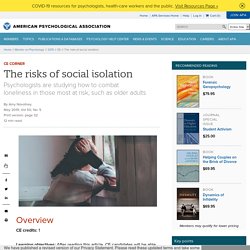
Population of the Ageing. Social isolation and the elderly poor in Singapore. SINGAPORE: Her one-room flat was a cluttered mess, and Madam Helen Fernandez herself never seemed to bathe, said her neighbours who always saw her in the same set of clothes. When case workers first visited the unkempt and confused elderly widow, they had to rush her to hospital for very high blood pressure – which resulted because she hadn’t been taking her medication and had been missing doctors’ appointments. Since her husband died 17 years ago, Mdm Fernandez had been living alone with no friends or family – and slowly falling prey to loneliness and dementia. There were times when she’d even call up the police just to talk.
It was how her case got referred to the Social Service Office, and then to case worker Ahmala Rajoo in 2015. “She was receiving financial assistance, about S$500 a month,” said Ms Ahmala, a care executive with NTUC Health Cluster Support in Bukit Merah. Tackling Social Isolation & Depression in the Elderly. A variety of factors can contribute to isolation. How frailty leads to loneliness and isolation. Other factors than health. Causes of Social Isolation in Elderly Adults. No one likes to feel lonely or isolated, but for many seniors, it’s a feeling they know all too well.
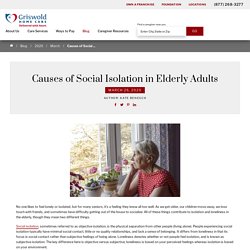
As we get older, our children move away, we lose touch with friends, and sometimes have difficulty getting out of the house to socialize. Caregiver experiencing isolation. 7 factors that could lead to social isolation. Winter can be an especially solitary time for some seniors, who may find they are spending more time alone in their homes because of bad weather or lack of transportation.

Canadian research shows that isolation isn’t just confined to the winter months for older adults: a recent federal government profile of social isolation estimated that 30 per cent of seniors are at risk of becoming socially isolated.* A report from the International Federation of Ageing also identified social isolation as one of the top issues facing Canada’s aging population.* What does it mean to be socially isolated?
While researchers give us differing versions of a complex term, it’s generally agreed to include a low number and quality of contact with others, as well as a lack of rewarding relationships. Research shows that seniors who feel isolated can experience a range of concerning health issues, including a higher risk for high blood pressure, heart disease, obesity, depression and cognitive decline 1. 2. 3. Loneliness in Elders, How Does it Feel? Impact of living in isolation. The consequences of socially isolating seniors - TMC News. As social creatures, humans are naturally hardwired to seek companionship and social connection, but COVID-19 is forcing people to adapt to a new reality anchored by social distancing and isolation. :::::::::::::::::::::::::::::::::::::::::::::::::::::::::::::::::::::::::::::::::::::::::::::::::::::::::::::::::::::::::::::::::::::::::::::::::::::: Looking for the latest on the CORONAVIRUS?
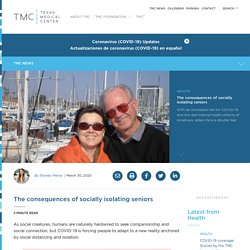
Read our daily updates HERE. :::::::::::::::::::::::::::::::::::::::::::::::::::::::::::::::::::::::::::::::::::::::::::::::::::::::::::::::::::::::::::::::::::::::::::::::::::::: Social distancing is critical to managing the coronavirus pandemic, as it will help flatten the curve and prevent the United States health care system from collapse. “They’re very worried. Social isolation, loneliness in older people pose health risks.
Human beings are social creatures.
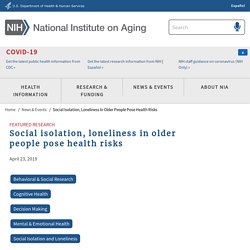
Our connection to others enables us to survive and thrive. Yet, as we age, many of us are alone more often than when we were younger, leaving us vulnerable to social isolation and loneliness—and related health problems such as cognitive decline, depression, and heart disease. Health Consequences. Loneliness and Social Isolation Linked to Serious Health Conditions. Social isolation was associated with about a 50% increased risk of dementia and other serious medical conditions.
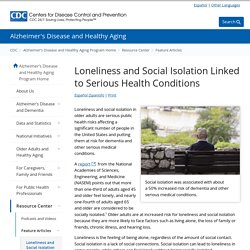
Isolation and Mental Health. Isolation and mental health: Signs, impact, and how to cope. Although physical distancing is an effective way to slow the spread of many viruses, it can also lead to feelings of loneliness and isolation, especially in older adults.
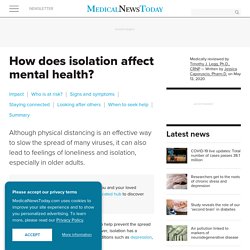
To help support the mental well-being of you and your loved ones during this difficult time, visit our dedicated hub to discover more research-backed information. People are distancing themselves from others to help prevent the spread of SARS-CoV-2, which causes COVID-19. However, isolation has a significant impact on health, contributing to conditions such as depression, anxiety, and dementia. For this reason, the World Health Organization (WHO) encourage people to continue socializing at a distance, such as by phone or via online platforms.
This article discusses how isolation and mental health affect each other. According to the WHO, social support networks can have a significant positive effect on health. The Social Distancing Risk for Seniors - BrainCheck. How Social Isolation Affects the Brain. Daisy Fancourt was at her home in Surrey in southeast England when the UK government formally announced a nationwide lockdown.
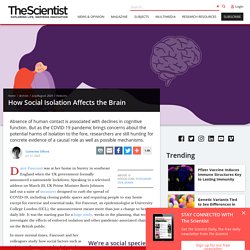
Speaking in a televised address on March 23, UK Prime Minister Boris Johnson laid out a suite of measures designed to curb the spread of COVID-19, including closing public spaces and requiring people to stay home except for exercise and essential tasks. For Fancourt, an epidemiologist at University College London (UCL), the announcement meant more than just a change to her daily life. It was the starting gun for a huge study, weeks in the planning, that would investigate the effects of enforced isolation and other pandemic-associated changes on the British public. We’re a social species. We really need others to survive. Isolation and Physical Health. Risk of Increased Physical Inactivity During COVID‐19 Outbreak in Older People: A Call for Actions - Roschel - 2020 - Journal of the American Geriatrics Society. The World Health Organization labeled coronavirus disease 2019 (COVID‐19) a “public health emergency of international concern,” declaring it a pandemic in March 2020, with approximately 1,910,000 cases and greater than 123,000 deaths worldwide.1 Case‐fatality rates dramatically increase with age, starting at approximately 0% to 1% in individuals aged between 20 and 59 years and scaling up to approximately 8% to 13% in individuals between the ages of 70 and 79 years and approximately 15% to 20% among those 80 years or older.2 Given the lack of available evidence‐based treatments and vaccines for COVID‐19, public health actions are of the utmost importance, with social distancing being recommended for infection control.3, 4 Despite the latter's positive effects on disease spread, the potential increase in sedentary behavior due to isolation can be detrimental to health.
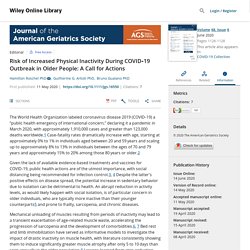
Note: Adapted from the World Health Organization's recommendations.16 Conflict of Interest Author Contributions None. Covid-19 on elderly. How does the COVID-19 pandemic affect older adults? The challenges of the COVID-19 pandemic are different for various socio-demographic groups, and Medical News Today has zoomed in on the ways in which this crisis has affected the more vulnerable ones. In this Special Feature, we focus on how the pandemic has affected older adults. To discover more evidence-based information and resources for healthy aging, visit our dedicated hub. All data and statistics are based on publicly available data at the time of publication.
Some information may be out of date. Visit our coronavirus hub and follow our live updates page for the most recent information on the COVID-19 outbreak. As part of a new series of features, MNT has looked into how the pandemic affects women’s reproductive rights, people that may find themselves in an abusive relationship, as well as the mental health of people of color and those belonging to an ethnic minority group. The COVID-19 disease, in itself, has hit older adults harder than other age groups.
Prof. How isolation affects seniors during COVID-19. Enforcement of safety guidelines. Social isolation: The COVID-19 pandemic's hidden health risk for older adults, and how to manage it. As coronavirus cases rise again, it can be hard for older adults to see any end to the need for social isolation and the loneliness that can come with it. For months now, they have been following public health advice to reduce their risk of exposure by staying home, knowing an infection can have life-threatening complications.
But sheltering at home has also meant staying distant from family, friends and the places that kept them active and engaged. Autonomy or isolation - What's best for the elderly? Advice for seniors during COVID-19 pandemic. Compassionate Care for Elderly Patients in the Era of COVID-19. Finding meaning in life. Ways of Preventing Social Isolation Among Seniors. As seniors age, their lives can become more isolated.
Their families are no longer at home with them, and they may begin to isolate themselves from the outside world because it has become more difficult for them to get out. Social isolation among seniors can also impact their health. A study by the Proceedings of the National Academy of Sciences showed that seniors have a 26 percent higher death risk than the elderly that remain social. Preventing Elderly Isolation. Stopping loneliness in the elderly with letters. Consideration and measurements. 9 Coping Strategies for Caregivers of Seniors - My Mental Health. Supporting Seniors & Elderly 9 Coping Strategies for Caregivers of Seniors 1 July 2020 | 8 min read.
Interventions. Treatment of the Elderly. Causes Week 2017: Helping seniors avoid social isolation. Engaging social interactions. TODAYonline. SINGAPORE — Beyond financial incentives from the Government’s Pioneer Generation Package, there is a need to strengthen social support networks, which can bring better health outcomes for senior citizens, researchers from the National University of Singapore (NUS) have suggested. Their study, which is ongoing, showed that the lower-income elderly have weaker social support and are, therefore, less likely to attend health screenings.
The three-year study, which was shared yesterday during an NUS symposium on successful ageing, found that having close friends and family members is important, as they are the ones who would encourage the elderly to go for blood tests for diabetes and cholesterol. 50 Activities for the Elderly in Lockdown and Isolation. This is one of many free activities. Mental Health Minute: Supporting the Elderly during COVID-19.
Information for Older Adults and Caregivers During the COVID-19 Pandemic. Experts here at U-M have put together some suggestions to help you and your loved ones stay safe during the COVID-19 pandemic. Essential roles of care giving , fostering positive outcomes. More support needed for caregivers of elderly family members: Aware, Singapore News. SINGAPORE - Employees should have the right to request flexible work arrangements and be entitled to six days of paid eldercare leave, said the Association of Women for Action and Research (Aware). These changes will help to support workers caring for older relatives and ensure that their own retirement nest eggs are not compromised by caregiving, the advocacy group said.
Announcing the results of a study involving interviews with 22 family caregivers and 22 care sector stakeholders, Aware's head of research and advocacy Shailey Hingorani said on Wednesday (Sept 18) that more caregiver support is needed, as Singaporeans can expect to face a growing family caregiving burden as a result of the ageing population. "The filial piety demonstrated by family caregivers is truly something to admire, but we should recognise that devotion alone is not sustainable. It needs to be supported by more concrete assistance from the state," said Ms Hingorani. They Spend Their Weekends Befriending Our Local Elderly. Providing a helping hand to the elderly in this time of social isolation. The Befriending Scheme. TOUCH Caregivers Support (TCG) Singapore.
Metta Welfare Association. Caregiving Welfare Association. Caregivers Alliance Limited. Senior Care Centres.